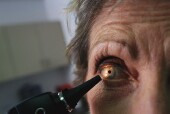
MONDAY, April 2 (HealthDay News) — First-time users of osteoporosis drugs called oral bisphosphonates may be at increased risk for serious inflammatory eye disease, a new study contends.
Oral bisphosphonates, such as Fosamax and Actonel, are the most commonly prescribed class of drugs to prevent or slow osteoporosis, a disease that causes very weak bones. Previous studies have linked the drugs to problems such as unusual fractures, irregular heartbeat and esophageal and colon cancer.
In addition, some case reports have shown an association between the drugs and inflammatory eye diseases — anterior uveitis and scleritis — that can cause serious vision impairment.
In this new study, Canadian researchers compared nearly 11,000 first-time users of oral bisphosphonates and more than 920,000 non-users. First-time users had incidence rates of 29 per 10,000 person-years for uveitis and 63 per 10,000 person-years for scleritis, compared with 20 per 10,000 and 36 per 10,000, respectively, for non-users. Per-person years are determined by multiplying the number of participants by the number of years the drugs are taken.
The study is published April 2 in the journal CMAJ.
“We found that first-time users of bisphosphonates are at an increased risk of scleritis and uveitis,” wrote Dr. Mahyar Etminan, of the Child and Family Research Institute and the Department of Medicine at the University of British Columbia, and colleagues in a journal news release.
“Our study highlights the need for clinicians to inform their patients about the signs and symptoms of scleritis and uveitis, so that prompt treatment may be sought and further complications averted,” they added.
More information
The National Osteoporosis Foundation has more about osteoporosis medications.

